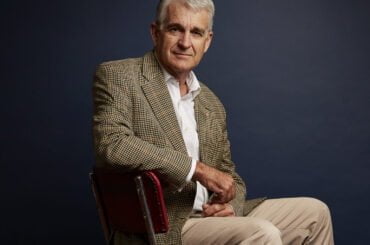
Memo to Kim Williams and the ABC: This is the age of ‘bro’ podcasts
The comments by the chairman of the ABC about Joe Rogan make you wonder whether he is another prime example of a disconnected elite. Is Williams unaware of what normal citizens are seeking, of the shortcomings of the organisation he oversees, and indeed, unaware of what alternatives to the establishment media really entail?
Did he accidentally mistake Rogan for Andrew Tate, or someone else he’s heard of second-hand, as he decried “people like Mr Rogan” whose actions in the media space he finds “deeply repulsive”?
The most anticipated interview of the US election was Donald Trump sitting down with Rogan for a long three-hour chat about the state of America. Not CNN, not FOX, not MSNBC – but a former comedian and TV show host who talks to retired professional fighters, social media commentators, and contrarian scientists about anything ranging from the perfect grappling technique, whether dragons ever existed, to how safe and effective the COVID-19 vaccinations were.
Amidst this variety, Rogan earnestly addresses serious questions of policy and culture, at a level unseen in the mainstream media, or MSM. Perhaps more importantly, he encourages the sifting of a range of views on contentious topics so that his viewers can then make up their own minds.
How different things might be if the ABC were to similarly appreciate viewpoint diversity.
The Trump-Rogan interview got nearly 40 million views on YouTube alone in its first three days. There can be little doubt that it contributed to Trump’s convincing win, for he was not preaching only to the converted on Rogan’s show.
Joe Rogan has 65 million subscribers across multiple platforms, 80 per cent of them male. Research suggests his audience is young, averaging between 18 and 34 years. Most importantly for Trump, 32 per cent of Rogan’s listeners identify as Republican, 27 per cent identify as Democrat, and the rest are undecided or independent.
Ours is the age of the podcast.
In Australia, men and women have different podcast habits. Unlike in America, where a slim majority of podcast listeners are male, the majority of listeners in Australia – 60 per cent – are female, according to research carried out by Podcast Services Australia.
But the preferred genres are very different between the sexes. According to a YouGov survey last year, Australian men are significantly more likely than women to listen to podcasts about news and politics (21 per cent of male listeners to 12 per cent of female). Women are more likely than men to listen to health and living podcasts (14 per cent to 11 per cent), not to mention true-crime podcasts. Men are also much more likely to listen to podcasts on sport and business.
Why has there been a shift away from MSM to the world of podcasts? There are multiple reasons, but I’d focus on the increasing superficiality of MSM content and the flagrant ideological bias of much of it. The MSM trades on soundbites and fast, superficial interviews. Podcasts typically can range from 15 minutes to three hours or more in duration, taking “deep dives” into any topic you can imagine.
Perhaps equally significant, in general, the ideological slant of the MSM does not reflect the demographic reality among Australians, or Americans for that matter.
For example, the visual media in Australia – and especially the ABC – was overwhelmingly in favour of the Voice. Yet the Voice proposal was overwhelmingly defeated by Australians with a fraction over 60 per cent saying “no”. In other words, the message coming from the MSM was completely at odds with how most Australians thought and felt.
According to our in-house analysis at John Anderson Media, our videos and interviews on the Voice, which questioned the mainstream narrative, were the third most watched videos on the issue during the campaign period – well ahead of the ABC.
Much of the same MSM bias characterised the recent US election, in contrast to the way people actually voted. In other words, there’s a disconnect between the MSM and real people.
If the Voice is one example, looking back, I wonder if the approach to renewables will be another case where the MSM ends up being clearly at odds with the people who are increasingly better informed by fact-based analysis from non-MSM sources such as the Centre for Independent Studies. Time will tell.
Speaking personally, I am an Australian podcaster with a YouTube subscription base of 685,000 subscribers and over 230 million content views. While the ABC generally was interviewing people hostile to Donald Trump in the lead-up and aftermath of the last US election, I interviewed Victor Davis Hanson, esteemed American historian and author of The Case for Donald Trump. As of now, that interview has had 3.1 million views.
What was the most liked comment in the comments section? “This 71-minute video is more educational than 10 straight years of watching mainstream media.” Many in the MSM need to display sufficient humility to reflect on their professionalism.
Australians aren’t as passionate about their politics as Americans, so I’m not sure whether there will be a “Joe Rogan moment” in Australian politics that impacts an election. There are certainly obvious lessons for the MSM though: don’t underestimate your audience’s desire for deep analysis and viewpoint diversity, and stop thinking you can fool people that ideologically biased news is neutral.
As recent history has shown with the Voice referendum and the US election, the new media is here to stay, and long may it be a force to be reckoned with.
Originally published in Australian Financial Review
Original Article






